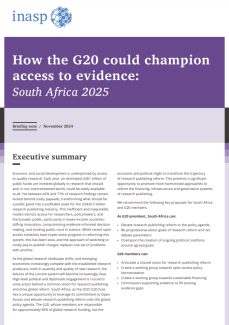
How the G20 could champion access to evidence: South Africa 2025
Download publication files
Economic and social development is underpinned by access to quality research. Each year, an estimated US$1 trillion of public funds are invested globally in research that should and, in our interconnected world, could be easily available to all. Yet between 42% and 77% of research findings remain locked behind costly paywalls, transforming what should be a public good into a profitable asset for the US$26.5 billion research publishing industry. This inefficient and inequitable model restricts access for researchers, policymakers, and the broader public, particularly in lower-income countries; stifling innovation, compromising evidence-informed decision making, and eroding public trust in science. While recent open access initiatives have made some progress in reforming this system, this has been slow, and the approach of switching to costly pay-to-publish charges replaces one set of problems with another.
As the global research landscape shifts, and emerging economies increasingly compete with the established research producers, both in quantity and quality of new research, the failures of the current system will become increasingly clear. High-level political and diplomatic engagement is crucial to unite actors behind a common vision for research publishing and drive global reform. South Africa, as the 2025 G20 host, has a unique opportunity to leverage its commitment to Open Access and elevate research publishing reform onto the global policy agenda. The G20, whose members are responsible for approximately 90% of global research funding, has the economic and political might to transform the trajectory of research publishing reform. This presents a significant opportunity to promote more harmonised approaches to reform the financing, infrastructure and governance systems of research publishing.
In this brief we explore how.
To read more about the wider project see Strengthening Science Diplomacy and Official Development Assistance Policy for Research Publishing Reform
